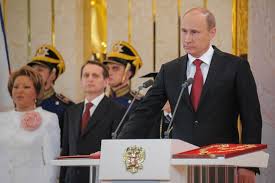 Russian President Vladimir Putin welcomed Kazakhstan and Belarus on Thursday into a new Eurasian Economic Union built to rival the United States, EU and China - but the absence of Ukraine undermined his dream of restoring Soviet glory days.
Russian President Vladimir Putin welcomed Kazakhstan and Belarus on Thursday into a new Eurasian Economic Union built to rival the United States, EU and China - but the absence of Ukraine undermined his dream of restoring Soviet glory days.
Although Putin denies he is trying to rebuild the USSR, he makes no secret that his dream is to reverse the consequences of its breakup by drawing former Soviet states closer together. The signing ceremony, held in Kazakhstan's new oil-funded boomtown capital Astana, was his biggest step yet in realising that goal.
But events since February - when a pro-Russian leader was toppled in Ukraine, Putin responded by seizing Ukraine's Crimea peninsula and the West imposed sanctions - have cast a pall over the new union's birth.
The Eurasian Economic Union that has taken shape after years of planning is a shadow of the economic powerhouse Putin once dreamed of, snubbed by most former Soviet states and dominated by a Russian economy that is itself sliding into recession.
Still, the new union has a market of 170 million people, a combined annual GDP of $2.7 trillion and vast energy riches, and it can be held up by Putin to show Western sanctions imposed over the annexation of Crimea will not isolate Russia.
The treaty deepens ties forged when the three countries took the initial step of creating a customs union in 2010. It guarantees the free transit of goods, services, capital and workforces and coordinates policy for major economic sectors. "Our meeting today of course has a special and, without exaggeration, an epoch-making significance," Putin said of the treaty, signed to loud applause from rows of seated officials.
"This document brings our countries to a new stage of integration while fully preserving the states' sovereignty."
His reference to sovereignty was telling because Kazakhstan fought hard during negotiations to ensure it did not give up any of the independence it won as the Soviet Union collapsed, scotching Russian hopes of creating a political union.
Kazakh President Nursultan Nazarbayev, seated at a long white desk at which he, Putin and Belarusian President Alexander Lukashenko signed the treaty, said the union would be an "economic bridge between the East and the West".
Lukashenko darkened the party's mood by mentioning the most important of the guests that stayed away.
"We lost someone, Ukraine ... for Ukraine, the burden was too heavy," the Belarus leader said. "Sooner or later the Ukrainian authorities will know where happiness is."
PUTIN'S DREAM
The Eurasian Economic Union will formally come into force on Jan. 1 once approved by the countries' parliaments, a formality for three presidents that have no serious internal opposition.
The union - an idea first raised by Nazarbayev in 1994 but widely ignored at the time - brings to life Putin's dream of uniting like-minded countries, capitalising on the nostalgia of many Russians for the order and relative economic and political stability of the communist Soviet empire that collapsed in 1991.
Putin noted that Kazakhstan and Russia accounted for one-fifth of the world's natural gas reserves and 15 percent of oil reserves - although Belarus's struggling economy looks like a burden for Astana and Moscow.
The new union reinforces Putin's drive to show Russia will not be isolated by sanctions, a message he sent by reaching a $400-billion gas supply deal with China last week.
But any hopes of rebuilding a large part of the Soviet Union have been thwarted by Ukraine, with some 45 million people, by far the most populous ex-Soviet state after Russia itself.
That blow, in the words of ex-Kremlin spin doctor Gleb Pavlovsky, makes Putin's original dream "impossible" to fulfil.
Armenia and Kyrgyzstan, both tiny and poor, are considering joining. But other ex-Soviet republics, including big energy producers Azerbaijan and Turkmenistan, have steered clear.
Shortly before the treaty was signed, Russia's biggest bank reported an 18 percent decline in profits in the first quarter and more than doubled its provision for bad loans, with sanctions and instability caused by the Ukraine crisis partly to blame.
The creation of the new alliance also involves costs for Russia. Deputy Finance Minister Sergei Shatalov told Reuters in March that Belarus and Kazakhstan received about $6 billion annually from Russia in direct and indirect support, and said that could increase by $30 billion if all trade restrictions were lifted in 2015 after the union is created.
(Additional reporting by Dmitry Solovyov in Almaty; Writing by Timothy Heritage; Editing by Peter Graff)
Reuters




